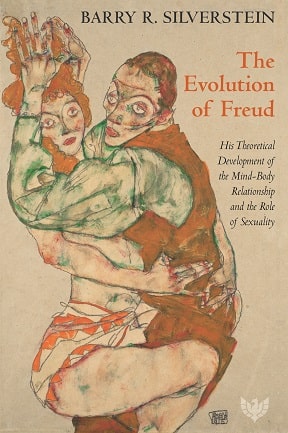The Evolution of Freud: His Theoretical Development of the Mind–Body Relationship and the Role of Sexuality

Book Details
- Publisher : Karnac Books
- Published : 2022
- Cover : Paperback
- Pages : 174
- Category :
Psychoanalysis - Catalogue No : 96242
- ISBN 13 : 9781912691401
- ISBN 10 : 9781912691
Reviews and Endorsements
The Evolution of Freud provides an accessible review of Freud’s thought. Barry R. Silverstein situates Freud in the late nineteenth century, elaborating on the intellectual and scientific teachings Freud encountered as a student and young physician. From there, he traces how Freud created a discipline, and therapeutic practice, designed to explore unconscious meaning.
Judith M. Hughes, author of From Freud’s Consulting Room: The Unconscious in a Scientific Age
Professor Barry R. Silverstein’s The Evolution of Freud is an adventure into Sigmund Freud’s thinking about the mind–body relationship and the role of sexuality in the structure of the psyche. He doesn’t just tell us what Freud thought he tells us how Freud thought. Silverstein includes the medical–intellectual context within which Freud was educated and pursued his interests, and also the way Freud thought about one problem after another in search of answers that would open doors to understanding the human psyche. Silverstein shows us how Freud struggled to understand psychiatric problems, theoretical conflicts, and all the new questions they raised. We witness Freud’s struggle to make sense of phenomena for which no previous theoretical concepts existed and his courageous efforts to find a way to create a comprehensive theory of the mind that future generations could develop and extend. Silverstein reminds us of the popular critiques regarding Freud’s cocaine use, sexism, intolerance, possible affair with his sister-in-law, lack of a scientific method, and so on, but, after spending four decades studying Freud’s work, Silverstein also appreciates (1) the “continuing relevance and application” of Freud’s ideas and concepts, (2) the significant scientific legacy he left in understanding how dynamic unconscious processes could affect cognitive functions, and (3) the powerful and clinically useful understanding of repetitive behavior patterns in human relationships – the repetition compulsions. In agreement with Silverstein, I would say yes, we all have our foibles but few of us write twenty-three volumes of enduring creativity to illuminate the human soul.
Daniel S. Benveniste, PhD, Honorary Member of the American Psychoanalytic Association and author of The Interwoven Lives of Sigmund, Anna, and W. Ernest Freud: Three Generations of Psychoanalysis
It is invaluable to know about Freud’s work. Even those who may disagree with much of it cannot understand contemporary psychoanalysis without appreciating the ways virtually all of post-Freudian psychoanalysis is a reaction to, an elaboration of, or an attempted improvement on Freud. But few people will be able to study and master the twenty-four volumes of his collected writings. The Evolution of Freud provides just what is needed: a profound, perceptive, penetrating presentation of the development of Freud’s thinking in an accessible, readable book.
James William Anderson, PhD, Professor of Clinical Psychiatry and Behavioral Sciences, Northwestern University; former President of the Chicago Psychoanalytic Society

